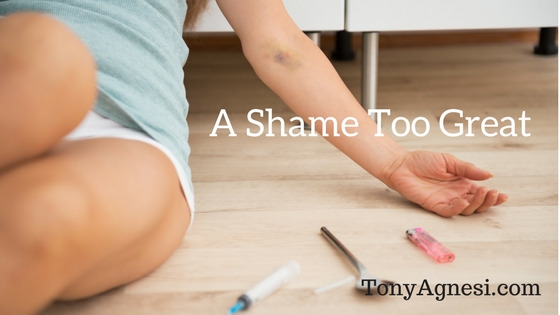 No trial has come to you but what is human. God is faithful and will not let you be tried beyond your strength; but with the trial he will also provide a way out, so that you may be able to bear it. — 1 Corinthians 10:13
No trial has come to you but what is human. God is faithful and will not let you be tried beyond your strength; but with the trial he will also provide a way out, so that you may be able to bear it. — 1 Corinthians 10:13This past month, I began my 13th year in jail ministry. We have seen many changes over these past 12 years. The single biggest change is the number of inmates addicted to heroin. A large percentage of people our ministry team see on weekly basis have a substance abuse disorder.
What are the reasons many don’t seek treatment? Why does arrest and incarceration have to happen before treatment begins?
For many, the answer is shame and guilt.
Two female inmates shared their stories this past week. Debbie (not her real name) arrested for theft. She was living in a tent in sub-zero weather because of shame. She could have been staying in a warm home. Her mother and daughter would welcome her. That wasn’t an option because that would mean she couldn’t continue her heroin use. The drug had that much power over her. She chose to live in a freezing tent to continue using because her shame was so debilitating.
Megan (not her real name) arrested for heroin possession. She had been sleeping in the doorway of retail stores, trying her best to block the wind. This wasn’t her first arrest. The shame and guilt were crippling.
Both women were quick to point out that they “felt free” in jail. It seem odd that being in jail made them feel free. Yet, held captive by their addiction and the shame and guilt made them feel trapped with no way out. It was a personal prison worse than jail.
During our time together we discussed shame and guilt. If you have a family member suffering from substance abuse consider these points:
· There is no reason for the suffering person to feel shame. They have already experienced the pain of addiction. As family and friends we are never going to shame them into treatment.
· Often, the shame keeps them from seeking help. Self-esteem is low and we need to let them know that they are not their disorder. They are good people and we love them. They have a substance disorder and we can’t let them define themselves by their illness.
· People with substance abuse issues blame themselves. The guilt makes them feel unworthy of treatment. They consider themselves a failure. If they suffered from any other illness or disease, no one would feel unworthy of treatment. We must help them remove the blame and let them know they deserve to live a good life. They are worthy.
There is an overwhelming feeling that others are judging them. They fear the stigma of addiction will be with them the rest of their lives. This can block them from seeking help. Some of the greatest people I know are recovering from addictions to drugs or alcohol.
The heroin epidemic has touched the lives of almost everyone. We all know someone with an addiction. At breakfast the other day a gentleman approached me. He saw me on a television interview and was moved by something I said.
He choked back his emotions and quietly shared, “I have two nephews addicted to heroin. You said that you have never met a bad person in the jail, only good people who have made bad choices.”
“I am in awe of what many have been through,” I replied. “It is not my job to judge them, only to help point the way to recovery and love them.”
Isn’t that what we all should be doing?

If you enjoyed this story, you can have Tony’s latest story delivered to your email every week, and not miss a single one. Simply subscribe by clicking here. You will be sent an e-mail to verify your subscription. Just click on the link and you’re all set.
Thank you for sharing my stories with your family and friends. Below are links to share on your social media sites.